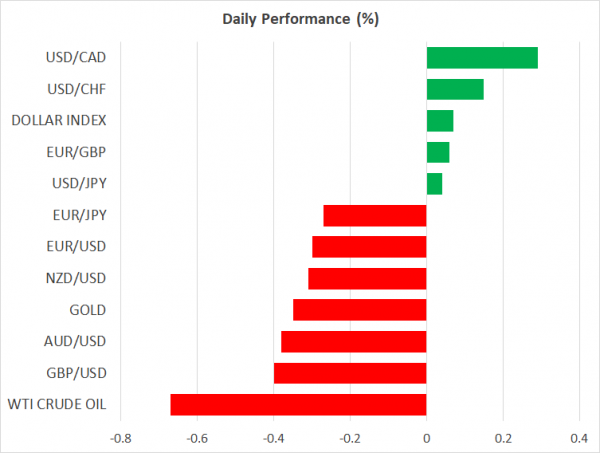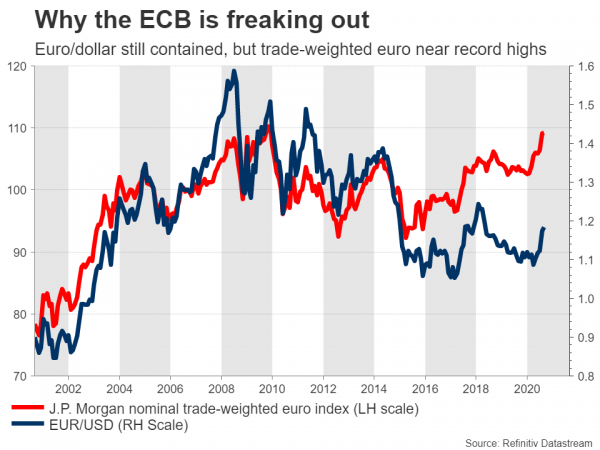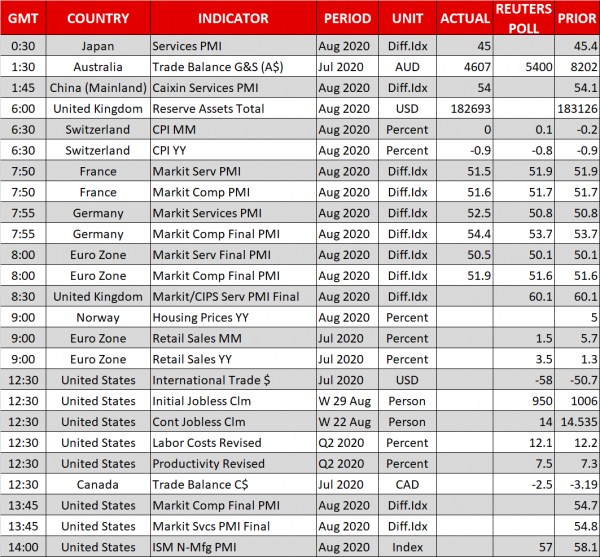- Euro/dollar extends correction lower after ECB officials raise the FX alarm
- Wall Street goes on a rampage as US government hypes a vaccine breakthrough
- Today: ISM non-manufacturing PMI, jobless claims, and central bank speakers
ECB: The dollar’s unlikely hero
The world’s most traded currency pair continues to drift lower, after the European Central Bank fired another verbal barrage to shoot the high-flying euro down. The latest media reports suggest “several” ECB officials are concerned that if the euro continues to appreciate it could weigh on growth and inflation, slowing the euro area’s economic recovery.
While the euro has been rising for a while, what really jolted the ECB into action was the Eurozone’s inflation print for August, which showed the bloc slipping into deflation. This was worse than even the grimmest ECB forecasts envisioned, and if inflation is already below zero, a stronger currency will only make the problem worse.
One might look at euro/dollar and conclude that the central bank is overreacting. After all, it has not risen that dramatically compared to historic standards. That would be an error. While euro/dollar is not at historic highs, the trade-weighted euro is almost there, and that is what matters most for policymakers. Likewise, it is not just how much it has risen – how quickly a currency appreciates also plays a giant role in how much it will impact inflation.
Overall, this still seems like a corrective phase in a broader uptrend for euro/dollar, not a trend reversal. The Fed has ‘out-printed’ the ECB by a mile, and as long as the market is trading on the US reflation theme and the ECB reacts through words instead of actions, a real reversal is unlikely. That said, this correction may still have legs to run as President Lagarde might jawbone the euro more aggressively at next week’s ECB meeting.
Stocks do what stocks do best
Meanwhile, the equity market is partying like there is no tomorrow. The S&P 500 rose 1.5% to close at another record yesterday, though surprisingly it was utilities and industrials that led the push, not the tech titans. Hence, investors are slowly rotating away from the stay-at-home winners and back into beaten-down value stocks, which signals growing confidence in the broader economy.
One reason that the equity market is in such a jolly mood is that a successful vaccine seems to be imminent. The US government has instructed states to prepare to distribute a vaccine by late October, fueling hopes of a breakthrough.
The market is therefore assuming that the virus might be defeated soon, but cheap-money policies from central banks will stay with us for many years as the Fed made clear recently, most likely alongside extravagant government spending. That is as good a reason as any to expect this sensational rally to continue.
Another element behind the market’s meteoric rise is that Trump has quietly closed the gap on Biden in betting markets and is catching up in opinion polls in key battleground states. Biden has threatened to roll back some of Trump’s corporate tax cuts, so what is good for the Donald is probably good for the stock market. Higher taxes could be lethal for this market because if one excludes Apple, Amazon, Microsoft, Facebook, and Google from the S&P 500, the index has posted almost no earnings growth for half a decade now.
Today: ISM non-manufacturing survey and speakers
The highlight on Thursday will be the ISM non-manufacturing PMI, which is expected to have lost some ground. Markets might focus mainly on the employment sub-index, to gauge where nonfarm payrolls might clock in tomorrow.
Finally, we will hear from BoE Governor Bailey at 14:00 GMT. ECB board member Schnabel speaks at 15:00 GMT and markets will be wary of any comments on the euro’s undesirable strength. The Fed’s Bostic and Evans are also on the schedule at 16:00 GMT and 17:00 GMT, respectively.



